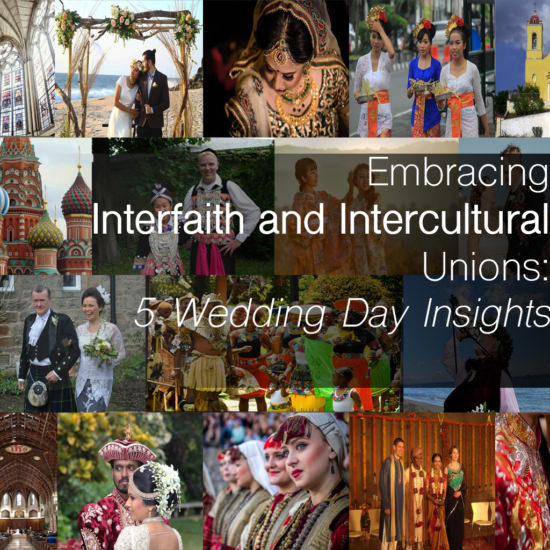 Some of the most beautiful ceremonies we have witnessed are intercultural and interfaith weddings. The creative process of learning about each other’s faith provides a true depth of understanding. Consider these five tips if you are looking at the possibility of attending or hosting an interfaith or intercultural wedding.
Some of the most beautiful ceremonies we have witnessed are intercultural and interfaith weddings. The creative process of learning about each other’s faith provides a true depth of understanding. Consider these five tips if you are looking at the possibility of attending or hosting an interfaith or intercultural wedding.
- Open Communication. Encourage open communication with the wedding party, guests and planners early. Develop a joint plan, including traditions from each faith that you and your fiance will highlight. Discussing customs and including parents goes a long way, especially if families are funding the festivities. Include culture & faith etiquette on the wedding website and/or program for guests.
- Diplomacy. Coordinate compromise with the bride’s and groom’s extended family. Say that even though this is your wedding, you plan to honor the faith of both families. Be mindful and courteous of important cultural cues that ensure respect and understanding when addressing extended family and in-laws. Use your diplomacy skills and remember you can’t please everyone.
- License & Permits. At least 18-24 months before planning a ceremony in a cathedral, mosque, temple, or synagogue, obtain special permits, attend courses, and follow protocol for approval. Whether the ceremony is in a park, garden, lake, or beach, special licensing may be needed for planning.
- Planning the Ceremony. Find a happy medium between the two faiths or cultures when planning the ceremony. Make sure to address each faith or culture with respect and taste. Strive to find a beautiful harmony while discussing logistics, details, and arrangements.
Infuse key elements of each faith during the ceremony
Include festivities from both cultures in the reception
Consider two separate ceremonies or a private ceremony
- Keep Learning. Continuing to learn and explore new aspects of your significant other’s faith or culture is integral to a successful marriage. Because their culture or religious affiliation is a part of their identity, you will want to keep in the mind the parts that matter most to them.
The summer wedding months have arrived and these tips will provide important information on planning an interfaith or intercultural wedding!
Sharon Schweitzer and Sophia Syed co-wrote this post.Sharon Schweitzer, J.D., is a cross-cultural trainer, modern manners expert, and the founder of Protocol & Etiquette Worldwide. In addition to her accreditation in intercultural management from the HOFSTEDE centre, she serves as a Chinese Ceremonial Dining Etiquette Specialist in the documentary series Confucius was a Foodie, on Nat Geo People. She is the resident etiquette expert on two popular lifestyle shows: ABC Tampa Bay’s Morning Blend and CBS Austin’s We Are Austin. She is regularly quoted by BBC Capital, Investor’s Business Daily, Fortune, and the National Business Journals. Her Amazon #1 Best Selling book in International Business, Access to Asia: Your Multicultural Business Guide, now in its third printing, was named to Kirkus Reviews’ Best Books of 2015. She’s a winner of the British Airways International Trade Award at the 2016 Greater Austin Business Awards.
Sophia Syed is a Spring 2017 cross-cultural communication intern with Protocol & Etiquette Worldwide. As a third-culture kid who has lived abroad in countries including Dubai, Jamaica, and Singapore, she has interacted with many different nationalities in both a professional and personal setting. She was a Dubai student representative for the Global Issues Network Conference in Luxembourg in the Spring of 2015, where she discussed economical, environmental and human rights issues with representatives of 70 countries. She currently attends the University of Texas at Austin as a double major in Corporate Communication and Communication Sciences. Her most recent project is working with the Room to Read organization, which raises funds for children’s literacy efforts and girls’ education in Asia and Africa.

Leave A Comment